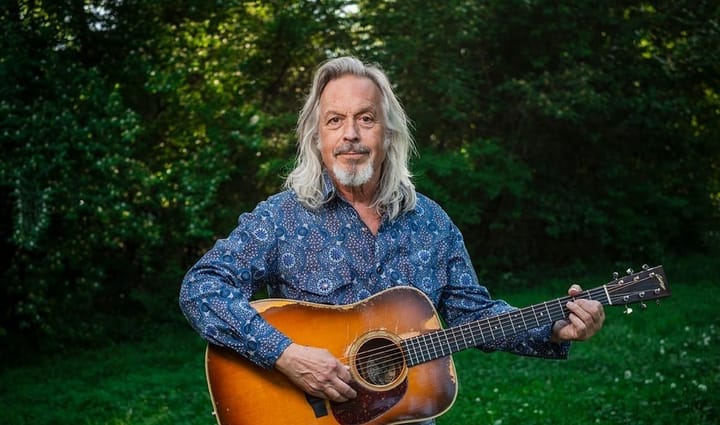Friday night during South By Southwest was what you'd expect from a music industry showdown slammed alongside St. Patrick's Day weekend and college spring break: bands slugging it out in clubs, tourists trailing into the streets, boozehound frat types prowling for a party.
Above it all that night in Austin was Tim O'Reagan. Eighteen floors up, at the top of the Capitol Place hotel, O'Reagan's midnight set of quiet, moonlit pop songs was a respite from the downtown chaos. Backed against a bank of windows showing a city mired in gridlock, O'Reagan and his band illuminated the room with harmonies and songs of sweet laments.
"Sorry that the songs are so damn slow," he grumbled shortly before finishing. Humility comes natural for O'Reagan; everyone who knows him will tell you so. He was at this industry conference making his debut as a singer-songwriter -- his self-titled disc comes out June 27 on Lost Highway -- although his resume tells a different story. After co-founding the Leatherwoods, a cult pop band revered despite its single-album output, O'Reagan drummed for the Jayhawks starting in 1995, the same year co-founder Mark Olson announced he was leaving.
During the years that followed, O'Reagan contributed occasional songs to a handful of Jayhawks albums, providing hints he was more than a dutiful timekeeper. When the band was put to rest, a steady gig ended, but an opportunity loomed. Even though he had been stashing away songs since 1989, O'Reagan knew it would take a special kind of courage to put down his sticks and stand in front of the drumkit rather than hide behind it, as he had been doing all these years.
Ask him how his decision feels, and he'll tell you straight: "nerve-wracking." Yet the alternative was worse.
"I was like, 'Either I'm going to do this singer-songwriter thing or I'll get out of the music business,' which was the scariest thing," he said. "On the other hand, I didn't have much of a choice because I didn't want to sell shoes."
Even before his Jayhawks days, O'Reagan was quietly earning a reputation in Minneapolis. "He's revered -- that's definitely the word to describe him," says Peter Jesperson, the former Replacements manager who co-produced the Leatherwoods album Topeka Oratorio. "Everybody knows he's one of the best singers that came out of that town."
O'Reagan arrived in Minneapolis in 1989 with musical partner Todd Newman. Both had grown tired of the music scene in their native Leavenworth, Kansas, and were at a crossroads. O'Reagan looked to both coasts but realized he was "too much of a pussy for L.A. and New York," he says. Newman heard there was something happening due north; he picked up his bags and O'Reagan followed.
The decision opened O'Reagan up to music he gave little attention to before. "I was just a drummer and I was into drums," he said. "I wasn't listening to singer-songwriter stuff. I was listening to bands with good drummers."
Minneapolis in the late 1980s was a boomtown for independent music. By that time the Replacements and Husker Du were the reigning stars of garage punk, and rising stars such as Soul Asylum were nipping at their heels. Despite the more raucous bands that grabbed all the headlines, on the west bank of Minneapolis there was a quieter folk, country and rockabilly scene that gave birth to the Jayhawks.
"On the first Soul Asylum record on A&M there was this song called 'We 3'," said Soul Asylum guitarist Dan Murphy. "Dave [Pirner] has this lyric, 'I was tapping my foot on a Friday night to my favorite band.' That was the Jayhawks. It doesn't seem musically we were coming from the same place, but it was a pretty big fraternity. I probably saw more [Jayhawks] shows in the 1980s than any other band."
When the Leatherwoods made their album in 1992, O'Reagan and Newman had developed a reputation around town for their silky harmonies and a sound that rotated between frisky power-pop and mournful folk-rock. Replacements auteur Paul Westerberg played guitar on the album and co-wrote two songs under a pseudonym. The disc was released by Medium Cool Records, a spinoff of Twin/Tone, the city's fabled record label that was the original home to the Replacements, Soul Asylum and the Jayhawks (as well as early Twin Cities rock scene pioneers the Suburbs and the Suicide Commandos).
Newman was the primary songwriter of the group. When the pair split just two days after the album was released -- O'Reagan attributed the dissolution to "lifestyle differences" -- it prompted O'Reagan to get serious about his own songs. Jesperson encouraged him to write; starting in 1993, O'Reagan would hand Jesperson cassette fragments of songs to be critiqued.
Many of those songs ended up on O'Reagan's current debut album. Although O'Reagan would soon get a job drumming for Joe Henry, which led to his role in the Jayhawks, he kept writing, quietly developing a reputation around Minneapolis as a triple-threat talent.
Joining the Jayhawks became another factor that would shape what O'Reagan was writing. "That really wasn't my kind of music," he says. "I was into soul music and pop music. The Jayhawks, I thought were interesting, but it wasn't my natural sort of music. But after I got the gig and started analyzing the songs, I really fell in love with the band."
When Mark Olson quit the same year that O'Reagan signed on, it seemed like a natural opportunity for another songwriter to fill his shoes. But Gary Louris, the band's remaining songwriter, had other plans.
"I can honestly say I probably I had a hand in holding him back a bit," Louris says. "I'm known for being a control junkie. When Olson left the band, all the sudden I saw an opportunity to finally be able to see more of my songs see the light of day. I probably got a little hoggish. I probably let Tim and [bassist] Marc Perlman contribute but not to the extent they would have liked."
It also became evident that O'Reagan considered himself first and foremost a sideman; he was hesitant to shake up whatever dynamic that was in play before his arrival. "Tim is probably not the most aggressive person I know in terms of ramming his songs or forcing the issue," Louris says. "He's a very classy guy."
O'Reagan's songs found their way onto two Jayhawks albums -- 1997's Sound Of Lies ("Bottomless Cup") and 2003's Rainy Day Music ("Tampa To Tulsa", "Don't Get The World Get In Your Way"). On 2000's Smile, he sang lead vocals on the Perlman/Louris song "Pretty Thing". He gave the Jayhawks a different dimension: His voice was rougher than Louris's, his lyrics even more dour. "I probably appreciate songs written when someone's depressed rather than songs written when they're all happy," O'Reagan allows.
His days in the Jayhawks came to an end last year when Louris moved to Spain and declared the band over. "I think it started to feel a bit monotonous to me, and I think for all of us," Louris says. "It was just time to try something different; I didn't care what it was."
O'Reagan says he "understood completely. The limitations were there; it wasn't going to change." Plus, he confronted the fact that he "was maybe going to get one song on a record and it wasn't going to turn into anything else. So that's what I had to look at -- one song, tour half the year and be away from home. It wasn't a total wrenching thing for me to quit the Jayhawks."
In some respects, O'Reagan's self-titled debut on Lost Highway could be the next Jayhawks album. Louris, Perlman, Olson and former Jayhawks keyboardist Karen Grotberg all turn up on the credits, though O'Reagan's primary collaborator is Jim Boquist, formerly of Son Volt.
Big-hearted melodies burst throughout the album on folk-pop songs flush with hangdog harmonies, harmonica and cresting choruses. O'Reagan turns a corner in his nods to the musical residue of his youth -- the cheery bubblegum-pop tune "That's The Game" and the fuzzy garage-rocker "Plaything". The songs transport you to those transistor radio days, his voice compressed so low that you can imagine it kicking through the palm-sized speaker.
O'Reagan acknowledges his fondness for "the dogshit pop, as Todd Newman used to say -- AM-radio pop. That's pretty much how my taste was formed -- on the radio. I wasn't an audiophile; I didn't go explore music that much. I had pretty pedestrian tastes as far as my formative years. So I appreciate the radio pop from the early 1970s and 1960s. All the stuff everyone knows and listens to."
But the main appeal of O'Reagan's music continues to be his bruising vocals on bittersweet songs that yearn for something better while never coming clean with the past. "I can see your face/A moonlight feast/I can hear your voice/Saying whatever hurts the least," he sings on "River Bends". With Louris, Olson and Grotberg blending their voices behind him, O'Reagan ruminates inside these lush songs, looking forward but not getting there just yet. The sweet relief comes when his big and sunny choruses kick in. These songs remind you that feeling bad can sometimes feel good.
"The seed of them came from actual depressive moments," he says. "I guess that's when you feel you have to make a song. I can't think of a time I've been happy and wanted to go run with a guitar. When I'm happy, I want to be happy."
Still, he knows that when facing your darkest regrets, there comes an upside: "That emotion is stronger and richer than happiness."




Comments ()